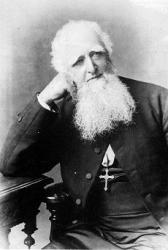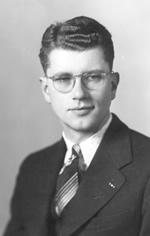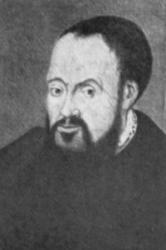Planning worship?
Check out our sister site, ZeteoSearch.org,
for 20+ additional resources related to your search.
- |
User Links
Person Results
Roger Chapal
b. 1912 Person Name: Roger Chapal (1912-) Paraphraser (French) of "New Songs of Celebration Render " in Common Praise (1998)
Roger Chapal
Gerardo C. C. Oberman
b. 1965 Person Name: Gerardo Oberman, b. 1965 Translator of "New Songs of Celebration Render (Nuevas canciones entonamos)" in Santo, Santo, Santo
Gerardo C. C. Oberman
Henry Lascelles Jenner

1820 - 1898 Person Name: Henry L. Jenner Translator of "Christians, Sing Out with Exultation" in The Lutheran Hymnal Jenner, Henry Lascelles, D.D., was educated at Trinity Hall, Cambridge (LL.B. 1841, in honours; D.D. 1867). Taking Holy Orders in 1843, he held several appointments until 1866, when he was consecrated Bishop of Dunedin. He retired in 1871. He is at present [1891] vicar of Preston-next-Wingham, Diocese of Canterbury, to which he was presented in 1854. His hymn in the 1889 Supplemental Hymns to Hymns Ancient & Modern, "Christians, sing out with exultation" (Christmas), is a translation of "Faisons éclater notre joie." See p. 391, ii.
--John Julian, Dictionary of Hymnology, Appendix, Part II (1907)
=============
Jenner, H. L., p. 1574, i. Bp. Jenner was born in 1820, and died in 1898. In C. W. A. Brooke's Additional Hymns, 1903, Nos. 962-966 are by Bp. Jenner and "A. Jenner." They are the "Catechism in Verse," and consist of 50 stanzas and a "Kyrie." They are well adapted for singing in connection with catechising in Church and School.
--John Julian, Dictionary of Hymnology, New Supplement (1907)
Henry Lascelles Jenner
Petrus Herbert
1530 - 1571 Author of "Chwal, dziękuj Bogu" in Śpiewnik Ewangelicki Herbert, Petrus, seems to have been a native of or resident at Fulnek in Moravia. He was ordained priest of the Brethren's Unity in 1562, became a member of the Select Council in 1567, and was latterly Consenior of the Unity. By the Unity he was entrusted with many important missions. He was sent as a deputy to confer with Calvin: and again in 1562 to arrange with Duke Christoph of Württemberg for the education at Tübingen of young men from the Bohemian Brethren. He was also one of the deputies sent to Vienna to present the revised form of the Brethren's Confession of Faith to the Emperor Maximilian II. in 1564, and in 1566 to present their new German Hymn Book. He died at Eibenschütz in 1571 (Koch, ii. 414, Allgemeine Deutsche Biographie, xiii. 263-264, &c.). Herbert was one of the principal compilers of the enlarged edition of the Brethren's German Hymn Book published in 1566 as their Kirchengeseng, and contributed to it some 90 hymns. In the ed. of 1639 there are 104 hymns marked as his. His hymns are distinguished by simplicity and beauty of style. A number are translations from the Bohemian. His hymns translated into English include:—
i. Die Nacht ist kommen drin wir ruhen sollen. [Evening] Written probably under the pressure of persecution and oppression. In the G. 2?., 1566, as above, in 5 stanzas of 7 lines (the last stanza being a versification of the Lord's Prayer), and thence in Wackernagel, iv. p. 442, and the Unverfälschter Liedersegen, 1851, No. 515. In J. H. Schein's Cantiona, 1627, it appears as No. 99, with an additional stanza not by Herbert, which reads—
Denn wir kein besser Zuflucht konnen haben,
,Als zu dir, 0 Herr, in dem Himmel droben,
Du veriest keinen, gibst Acht auff die deinen.
Die dich recht meyuen,"
This stanza is included as stanza v. in the version in Bunsen's Versuch, 1833, No. 43. Translated as:—
1. The night is come, wherein at last we rest, in full from Bunsen by Miss Winkworth in her Lyra Germanica, 2nd Ser., 1858, p. 77, repeated as No. 105 in R. Minton Taylor's Collection, 1872.
2. Now God be with us, for the night is closing, a good translation from Bunsen, in the original metre, by Miss Winkworth, as No. 170 in her Chorale Book for England, 1863, and repeated in her Christian Singers of Germany, 1869, p. 139. This version has been included in various recent collections, though generally abridged or altered, as in the Hymnary, 1872; Thring's Collection, 1882; and in America in the Evangelical Hymnal, N. Y., 1880, &c. In Laudes Domini, N.Y., 1884, it is in two parts (Nos. 209-210), the second beginning, "Father, Thy name be praised, Thy kingdom given." This is stanza vi. with an added doxology, as in the Hymnary, 1872.
Other translations are:—
(1) "The night comes apace," as No. 293 in pt. i. of the Moravian Hymn Book, 1754. (2) “Lo! evening's shades to sleep invite," by H. J. Buckoll, 1842, p. 64.
ii. 0 Christenmensch, merk wie sichs halt. [Faith] 1566, as above, in 18 stanzas of 4 lines, repeated in Wackernagel, iv. p. 433. In Bunsen's Versuch , 1833, No. 390 Allgemeine Gesang-Buch, 1846, No. 130), the hymn begins with stanza iii. altered to "Der Glaub’ ist ein lebend'ge Kraft," and consists of stanzas iii., viii., xi., xii., xvi., xviii. Bunsen calls it "a noble confession of the true Christian faith." Translated as:—
Faith is a living power from heaven. A good translation from Bunsen by Miss Winkworth in her Lyra Germanica, 2nd ser., 1858, p. 160, and thence in her Chorale Book for England, 1863. It is repeated, more or less altered and abridged, in Kennedy, 1863; and in America in the Presbyterian Hymnal, 1874, Baptist Service of Song, 1871, &c.
ii. Hymns not in English common use:—
iii. Des Herren Wort bleibt in Ewigkeit. [Holy Scripture.] 1566, as above, in 25 stanzas, and in Wackernagel, iv. p. 432. Translated as "God's holy Word, which ne’er shall cease," by J. Swertner, as No. 3 in the Moravian Hymn Book1789 (1849, No. 2).
iv. Fürchtet Gott, 0 lieben Leut. [Martyrs.] 1566, as above, in 13 stanzas, and in Wackernagel, iv. p. 429. The translations are, (i.) "O love God, ye people dear," as No. 267 in pt. i. of the Moravian Hymn Book, 1754. (2) "O exalt and praise the Lord" (from the version in the Brüder Gesang-Buch1778, beginning "Liebet Gott"), as No. 871 in the Moravian Hymn Book, 1789 (1886, No. 1306).
v. Lasst uns mit Lust und Freud aus Olauben singen. [Eternal Life.] A fine hymn on the Joys of Heaven. 1566, as above, in 12 stanzas, and in Wackernagel, iv. p. 447. Translated as "In faith we sing this song of thank-fulness," by Mrs. Bevan, 1858, p. 34.
vi. 0 höchster Trost, heiliger Geist [Whitsuntide.] 1566, as above, in 13 stanzas, and Wackernagel, iv. p. 407. The translations are, (1) "O highest comfort, Holy Ghost," as No. 262 in pt. i. of the Moravian Hymn Book, 1754. (2) "O Comforter, God Holy Ghost," as No. 203 in the Moravian Hymn Book, 1789 (1849, No. 265).
Besides the above a number of hymns by Herbert (all of which appeared in the Kirchengeseng, 1566, and are included in Wackernagel’s vol. iv.) were translated in pt. i. of the Moravian Hymn Book, 1754. The numbers in the 1754 are 166, 259, 263, 264, 265, 266, 274, 277, 281, 287, and 294. [Rev. James Mearns, M.A.]
-- John Julian, Dictionary of Hymnology
Petrus Herbert
Henry A. Bruinsma

1916 - 1991 Harmonizer of "NAVARRE (CORNERSTONE)" in Psalter Hymnal (Blue) It was in Bruinsma's musical compositions that his brilliance was most displayed. “Henry’s personality was … embodied in his music: colorful, radiating charisma, magnetic in a nonverbal way,” niece Jane DeGroot said.
Bruinsma displayed musical potential even before he was considered old enough to take music lessons, said his wife, Grace Hekman Bruinsma. The preschooler would eavesdrop on his older brother’s piano lessons. After the teacher left, Bruinsma would climb onto the piano bench to practice his brother’s lesson assignment. Later on, he chose to attend Ottawa Hills High School in Grand Rapids, Mich., for its music program.
Following high school graduation in 1933, Bruinsma attended the University of Michigan for a degree in music. He stayed on to complete a Ph.D. in musicology, becoming the first musicologist to graduate from the University of Michigan. It was during his graduate work that Bruinsma wrote Scherzo on a Dutch Nursery Song. “He never lost his love for Dutch history or Dutch Reformed music,” Grace Bruinsma said.
It was also during his time at U of M that Bruinsma began taking Grace to music concerts, and in 1939 they were married.
Bruinsma began his time as a professor of music at Calvin College (1946-55). In addition to his teaching duties at the college, Bruinsma taught the first music and theology course at Calvin Seminary. He also chaired the first Conference on Liturgy of Music.
However, not long after his time at Calvin, Bruinsma decided he was being called to move from teaching to education administration. Of note is his time at Ohio State University (1959-64), where he served as the director of the School of Music. He also held the position of executive committee member of the College of Education.
Next, Bruinsma moved to what is now Arizona State University (1964-79), another notable mark in his education administration career. During that time, he served first as chair of the School of Music, then as founding dean of the College of Fine Arts. He is also known to have started the first religious studies program at Arizona State as part of the university’s interdisciplinary studies program.
Due to the amount of time he spent in education administration, much of Bruinsma’s musical compositions were never published. After his death, Grace Bruinsma contacted Gerry Bouma of Morningside College in Sioux City, Iowa. Bouma and Henry Bruinsma had met in 1969 at a Grand Rapids Christian High School concert in Chicago. “For whatever reason, Henry and Grace treated us like we were their kids,” Bouma said. Grace asked Bouma to catalog and publish the 10,000 pages of Henry’s material. Taking a semester sabbatical, Bouma began his work.
Bouma’s catalog of Bruinsma’s work can be found in the Heritage Hall Archives at the Hekman Library, Calvin College. The Archives also hosts additional works from Bruinsma’s time at Calvin.
--Excerpted from Calvin Spark, Spring 2006 issue
Henry A. Bruinsma
C. Marot

1497 - 1544 Person Name: Clément Marot Author of "Rendez Á Dieu Louange Et Gloire" in The Cyber Hymnal Born: About 1497, Cahors, France.
Died: August 1544, Turin, Italy.
At age 16, Marot became a page to Nicolas de Neufville, and at age 21 Valet de Chambre to Marguerite de Valois. He later fought at Pavia, where he was wounded and taken prisoner with Francis I. From 1537-9 he translated about 30 psalms, which were published in 1542. He traveled widely, sometimes fleeing persecution, and stayed at various times in Savoy, Geneva, and Turin.
Sources:
Julian, p. 714
Lyrics;
Rendez à Dieu Louange et Gloire
http://www.hymntime.com/tch/bio/m/a/r/o/marot_c.htm
====================
http://en.wikipedia.org/wiki/Clément_Marot
C. Marot
Julius Anton Eugen Wilhelm von Poseck
1816 - 1896 Person Name: Julius Anton von Poseck, 1816-1896 Author of "Wo nichts ich seh' als eine Wüste" in Glaubenslieder
Julius Anton Eugen Wilhelm von Poseck


 My Starred Hymns
My Starred Hymns


